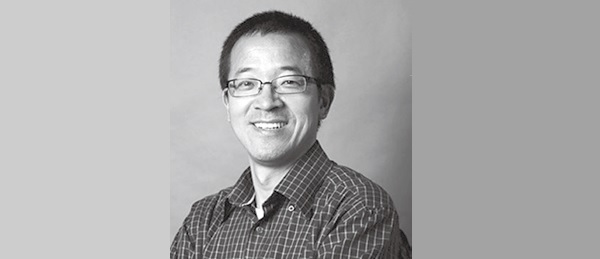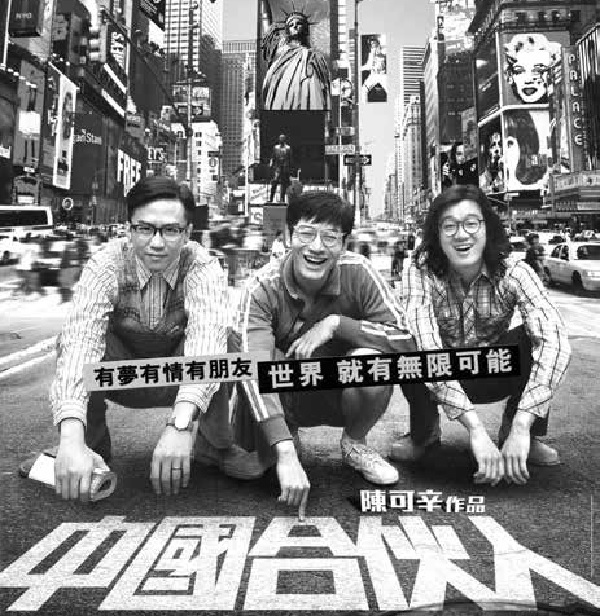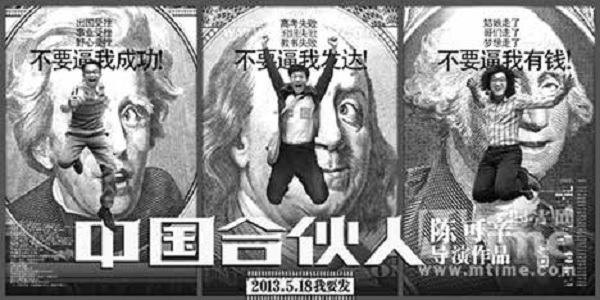Breaking out of the "American Dream"
Reflections on watching "Partners in China"

Is the new dream the Chinese dream of the 21st century or the American dream imagined by the Chinese people?
In May 2013, a movie called "Partners in China" was released in mainland China and attracted a lot of attention. The film is based on the 30-year period of great changes in China from the 1980s to the beginning of the 21st century. It tells the story of three college friends, Cheng Dongqing, a "native", Meng Xiaojun, a "returnee", and Wang Yang, an "angry youth" who jointly founded an English training school after graduation. "New Dream" story.
According to reports, the story is based on the "New Oriental" school, a famous English training institution in Beijing, and its main characters have the shadow of New Oriental founder Yu Minhong and others. As one of the earliest students of "New Oriental", I will never forget the days when I was studying English hard in lectures in lecture halls. I am deeply impressed by the "New Oriental spirit" of "looking for hope in despair". The ups and downs and twists and turns of New Oriental’s entrepreneurial story are something that I am not only familiar with, but have also witnessed. With curiosity and anticipation, I finally saw this movie.

▲Founder of Beijing New Oriental Education Technology (Group) Co., Ltd.: Yu Minhong.
A hero is not afraid of being of low origin, and a country bumpkin can become a rich man.
After watching the movie, I was not as moved as I expected, although I was mentally prepared to be moved. Maybe it’s because what I’m looking forward to seeing is Yu Minhong’s entrepreneurial and life journey from humble beginnings and failure to perseverance in dazzling success. What the movie presents is an inspirational youth story based on the business logic of "winners are princes, losers are bandits". The film contains young love, heartbreaking betrayal, ideal passion and shattered dreams. Of course, in the end, it is the victory of brotherhood, the resolution of crisis and the achievement of dreams.
After experiencing various tests of love, money and interests, the "New Dream" company's shares were listed on Wall Street in the United States. Cheng Dongqing donated money in the name of Meng Xiaojun, so that the laboratory where Meng worked to feed mice for survival was replaced by Meng's name. Naming. Not only did they win their careers, they also regained their friendship.
The melody of "Story of Time" sounded at the end of the film, and photos of grassroots elite entrepreneurs such as Liu Chuanzhi, Yu Minhong, Ma Yun, and Wang Shi appeared one by one from then and now. The meaning is self-evident: heroes do not care where they come from, no matter how ordinary they were back then. "Butterfly", no matter how many humiliating failures he has experienced, as long as he persists in working hard for his dreams and with loyal cooperation among friends, he may become a successful person that attracts much attention.
I'm not against motivation, people need to be encouraged and I like to be encouraged. However, the inspirational style of "China Partner" made me a little confused. The sunny ending of the film seems to be that a few Chinese people have occupied New York with friendship, brains and money, gained the respect of Americans, and reaffirmed their own value in life. On the surface, Cheng Dongqing and the other three have won. The United States, which had hurt them and rejected them, was now occupied and conquered by them. I'm a little confused. Having lived in the United States for many years, I don’t know what Meng Xiaojun means when he keeps saying he wants to “get the true respect of Americans.” Which Americans is he referring to? What kind of respect does he want? What is the new dream, and how is it realized?
The "Yanda" elite who became a waiter in a restaurant
Judging from the film itself, the gap in the life of the talented man Meng Xiaojun is the most obvious. He was a popular figure in the university at that time, and his family had been studying in the United States since his grandfather's generation. He has always longed to study in the United States to equip himself and change the world. However, the America he longed for turned him from a Yanda elite who taught and promoted literature to a bus boy doing odd jobs in restaurants.
Because of this experience, his dignity was ruined and his confidence was lost, so much so that after returning to China, he, who had always been extremely eloquent, became speechless in public. What he has been unable to let go of for many years is the money-worship logic of American society that only recognizes money and not people; it is the cruel reality of life that makes it impossible for him to display his talents; it is the fact that he was let go during a meeting and was beaten by the driver while taking a taxi. Those arrogant, racist Americans who yelled.
Because of this, he pursues success and pursues being the first. He advocated the company's joint-stock reform and made every effort to promote the company's listing. Ironically, the success of "New Dream" is also thanks to the foreshadowing of Meng Xiaojun's tragic experiences. It was precisely because the proud and flamboyant man went uncharacteristically and confessed to Cheng Dongqing his experience of abjection and inner loss that the "country bumpkin" Cheng Dongqing woke up and made the decision to list the company, which made Americans look at him with admiration.
Seeing this, I feel that Cheng Dongqing is really interesting. In order to gain face for his buddies and cheer for the country, he gave up sticking to his true inner voice of "I just want to teach well" and jumped into the muddy waters of Wall Street without hesitation. And Meng Xiaojun finally realized his dream. He used the issuance of his company's stocks to wash away the shame of not being able to get tips. By joining the capital side, he achieved the capital side's recruitment of the weak side. Seeing this, I don't know whether I should applaud his success or feel sad.


▲"Partners in China" tells the story of three college friends, Cheng Dongqing, a "native", Meng Xiaojun, a "returnee from overseas", and Wang Yang, an "angry young man", who jointly founded the English training school "New Dream" after graduation.
A plaque in a university laboratory
There is one detail in the movie that is important. There was a note in the dictionary that Meng Xiaojun gave to Cheng Dongqing, which said: "You will make me jealous." This sentence once deeply moved and inspired Cheng Dongqing, who had low self-esteem, but Meng Xiaojun finally admitted, It turned out that he wrote this to himself. For Meng Xiaojun, who has a high self-esteem, the years of working for survival in the United States have always been "the unbearable pain in his life."
However, Meng Xiaojun, who claims to know the United States best, does not realize that the American dream is a legend of starting from scratch, a story of restaurant waiters, grocery store clerks and car mechanics becoming bosses and gaining wealth, respect and status. Meng Xiaojun failed to cross this threshold and returned home sadly. After returning to China, he became famous for providing visa consultation, making money by sending more people to the country that destroyed his dignity and ideals, and finally relied on all this to re-enter the United States. Of course, this time he was a respected guest sitting in the same restaurant, no longer the jobber who was shouted at. He returned triumphantly with the company's stocks and was served by his colleagues who had deducted his meager tips. After going around in a big circle with the overwhelming feeling of past and present, my "dream" finally came true.
Has the "New Dream" taken over Wall Street?
Movies are fictional art. The story of "New Dream" is not entirely the story of "New Oriental". There is a lot of positive information in this movie, such as the spirit of fighting in a difficult situation, the courage to become more motivated in the face of setbacks in entrepreneurship, and the true love between brothers that transcends interests, etc. It is a pity that the dream of the "new dream" is a passive dream, a dream that is forced into a dilemma between expectation and reality.
Just as what is said in the movie: "We cannot change the world, the world changes us." In this sense, this movie quite accurately expresses the changes in the dreams of the three Cheng Dongqings over the past forty years:
On a campus full of idealistic passion in the 1980s, Cheng Dongqing's dream was to memorize an entire English dictionary, read 800 books a year, and then obtain a visa to study in the United States like Meng Xiaojun, whom he admired; in 1990, when the money boom hit, In the 1990s, Cheng Dongqing was expelled for tutoring outside school. His dream was forced to make money to survive, and he embarked on the road of entrepreneurship by accident. Entering a new century, Cheng Dongqing became the "godfather of studying abroad", and his dream changed from teaching to "Occupy Wall Street".
In such a life trajectory, from beginning to end, the dreams of Cheng Dongqing and the three of them revolved around the United States. Whether it was memorizing English dictionaries crazily in the 1980s and being rejected many times when applying to go abroad; whether it was the hardships of making a lot of money from English training and visa consulting and building a school in the 1990s; or the subsequent listing of the "New Dream" company in the United States, a long-awaited The American dream that has not been realized and becomes more urgent has always been a shadow and a strange circle that Cheng Dongqing and the three people cannot get out of.
Regardless of failure or success, the "new dream" of Cheng Dongqing and the three people has always been defined by the United States. At the moment when the "New Dream" took over Wall Street, I wonder if it was Cheng Dongqing and the others who conquered the United States, or Wall Street conquered Yanda's Huguang Tower? When Meng Xiaojun looked at the sign engraved with his name and shed tears because he had realized his dream of being "truly respected by Americans", should he feel lucky that he would not have been "reduced" from a teaching assistant in a laboratory to How could he have the success and reward he has today after being stimulated by the tragic experience of being a restaurant worker?
Delivering the American Dream or American Myth?
Having said all this, I am actually not against dreams at all. People should have dreams, and a life with dreams is a meaningful life. What makes me hesitate is the dream shown in this movie: an external dream that is too hard to extricate itself from the so-called "American Dream". This "American Dream" is not even what Americans call the American Dream, but the dream of success constructed by Cheng Dongqing themselves.
Their initial dream journey was aborted, but they were unable and unwilling to give up the privilege of telling this dream. Although in Cheng Dongqing's real life, the United States is not a dream. The United States was once their nightmare: the United States shut them out and even stepped on them, took their women away, and made them lose their sense of worth and dignity... Cheng Dongqing and the others continued to tell American myths to their students. By constructing this myth, they achieved unprecedented status and wealth.
In fact, Cheng Dongqing, the godfather of studying abroad, has never set foot on American soil, while senior visa consultant Meng Xiaojun’s experience in the United States is almost unbearable to look back on. Because of the gap between their own experiences and the myths they tell, their new dreams inevitably appear to be wishful thinking. If in the 1980s, their American Dream still contained the ambition and dream to change the world, now the American Dream that allows them to achieve success and wealth is a real daydream.
At the end of the movie, Cheng Dongqing said: "Real success is to live with dignity as an ordinary person." This sentence is my favorite line in the entire movie. Speaking of which, let’s talk about some movie digressions. In my personal memory, Yu Minhong is able to endure hardships, is willing to suffer losses, is devoted to work, and does not pretend to be pretentious. He once said:
"A person's life is a life of struggle, but some people live a great life, and some people live a trivial life. If we have a great ideal and a kind heart, we will definitely be able to turn many trivial days into Stack them up and become a great life." In fact, this sentence better represents and defines his success than the "new dream" in the movie.
Looking for hope in despair
Recently I learned that the New Oriental school motto "Find hope in despair" comes from the famous speech "I Have a Dream" by the famous American black civil rights activist Reverend Martin Luther King. For Pastor King, his dream is to enable ordinary people (black people in the United States) to live with dignity.
If Cheng Dongqing's dream is the realization of self-worth, and their motivation to fight against despair comes from their persistent pursuit of their own success, then Pastor Jin En's power to fight against despair comes from the faith he insists on in his heart. On August 28, 1963, in front of the Lincoln Memorial in Washington, this young Baptist pastor told an audience of 250,000 people about his dream:
"I have a dream that one day this nation will stand up and truly live out the true meaning of its creed: 'We hold the truth to be self-evident, that all men are created equal.'
I have a dream that one day, in the red hills of Georgia, the sons of former slaves will be able to sit down with the sons of former slave owners and talk about brotherhood.
I have a dream that one day even Mississippi, a place where justice is invisible and oppression is rife, will be transformed into an oasis of freedom and justice.
I have a dream that one day my four children will live in a country where they will be judged not by the color of their skin, but by their character...
I dream that one day, the valleys will rise and the mountains will descend; the rough and tortuous roads will become smooth, and the glory of God will appear and fill the world.
This is our hope, and it is with this belief that I return to the South.
With this belief, we will hew out of the mountain of despair a stone of hope… (We will hew out of the mountain of despair a stone of hope…)”
Pastor Jin’s dream is based on his Christian faith. This dream is based on selfless love, at the cost of sacrifice and sacrifice. What Pastor Jin En cares about is not whether his dream can be realized, but whether the goal he pursues is just and legitimate. The dignity he strives for is not the victory of one ethnic group against another, but the reconciliation between ethnic groups through non-violent means.
His dream transcends persistence in victory, breaks through the limitations of self and external environment, follows the example of Jesus’ bloodshed and sacrifice on the cross, and finds the power of redemption in love and suffering. It is this kind of belief that allows his dreams to transcend the despair of real circumstances, inspire thousands of people, and bring them hope in life.
Find dreams that are in line with God’s heart
Many people have dreams about life. Realizing oneself and gaining recognition from society and others are people's basic demands for survival. I'm also thinking about whether dreams are inspired by people's inner beliefs and passions, or are they influenced and given by the outside world? Is dignity a person’s affirmation of the value of his or her own life, or is it recognition from others? Does success come from determination and persistence in struggle, or from the wealth and status finally obtained? Is happiness the result of success or the process of faithfully pursuing your dreams?
Times have changed, and Teacher Yu, who abandoned his job at Peking University in "despair", has become a successful person and inspirational idol in the minds of millions of people. His life story also became a dream example in the movie. But what I miss is the tall, thin, unkempt, dedicated, low-key and humble young English teacher. Talking about this movie again, I just want to say: Dreams are not defined by others, and self-worth is not always supported by the attention of the outside world and the recognition of Wall Street. Yu Minhong once said: "We go all the way, not because we are strong, but because we have no choice." Perhaps, for Teacher Yu, he is still continuing to search for and build his own dreams. After all, if you want to win the true respect of others, you must first find yourself. This also includes diligently searching for dreams that are not only your own but also in line with God’s will.
 Author profile
Author profile
Yama, reader, writer, doctor, mother. Born in Beijing, now lives in Texas, USA. Enjoy family life, occasional outings, and long hibernations. I like inexpensive food, unhurried itineraries, simple happiness, appropriate friendships, and are willing to search for treasures in recycled pottery, both physical and memory and imaginary. He behaves calmly in real life, and his heart is filled with words, music, pictures, and images. Sometimes complex, sometimes simple. Life is not perfect, grace is always with you. Because you are walking together, you will not be lonely.
